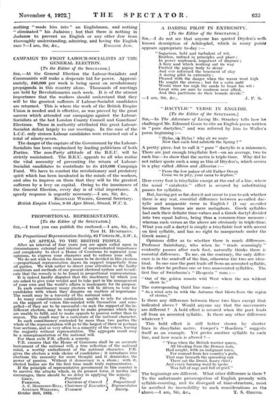DACTYLIC " VERSE IN ENGLISH. [To the Editor of the
SPECTATOR.] SM,—In The Adventure of Living Mr. Strachey tells how he challenged Mr. Edmund Gosse to cite an English poem written in " pure dactylics," and was referred by him to Waller's poem beginning :- " Hylas, oat Hylas ! why sit we mute
Now that each bird saluteth the Spring ? "
A pretty piece, but to call it " pure " dactylic is a misnomer.
There are just enough trisyllabic feet—on an average, two to each line—to show that the metre is triple-time. Why did he not rather quote such a song as this of Dryden's, which occurs in a play called Albion and Albanius :- "From the low palace of old Father Ocean Come we in pity, your cares to deplore."
Here every foot is trisyllabic except at the end of a line, where
the usual " catalectic " effect is secured by substituting pauses for syllables.
But, having got so far, does it not occur to you to ask whether there is any real, essential difference between so-called dac- tylic and anapaestic verse in English ? [I say so-called because these terms are mere metaphors. Greek syllables
had each their definite time-values and a Greek dactyl divided into two equal halves, being thus a common-time measure ; whereas such verses as the above are obviously in triple-time. What you call a dactyl is simply a trisyllabic foot with accent on first syllable, and has no right to masquerade under the Greek name.] Opinions differ as to whether there is much difference. Professor Saintsbury, who when he " reads scanningly " evidently pauses after each foot, naturally thinks there is essential difference. To me, on the contrary, the only differ- ence is in the send-off of the line, otherwise the two are iden- tical. In one case the poet leads off from an accented syllable, in the other he prefixes one or two unaccented syllables. The first line of Swinburne's " Hesperia " runs :- " Out of the golden remote wild West where the sea without shore is."
The corresponding third line runs :-
" As a wind sets in with the Autumn that blows from the region of stories."
Is there any difference between these two lines except that
indicated above ? Would anyone say that the movements are different ? A bold effect is secured when the poet leads off from an accented syllable. Is there any other difference whatever ?
This bold effect is still better shown by shorter lines in dissyllabic metre. Cowper's " Boadicea " suggests itself as an example. Yet prefix another syllable to each line, and how much is altered ?— " 'Twas when the British warrior queen, All bleeding from the Roman rods, Had sought, with an indignant mien,
For counsel from her country's gods,
That sage beneath the spreading oak There sat the Druid, hoary chief ;
And every burning word he spoke Was full of rage and full of grief."
The beginnings are different. What other difference is there ? To the unfortunate preoccupation of English prosody with
syllable-counting, and its disregard of time-structure, must be ascribed its insensibility to such considerations as the






































 Previous page
Previous page